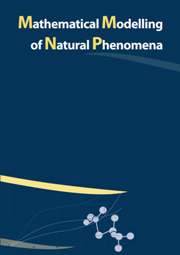Article contents
Hopf Bifurcation Analysis of Pathogen-ImmuneInteraction Dynamics With Delay Kernel
Published online by Cambridge University Press: 15 June 2008
Abstract
The aim of this paper is to study the steady states of the mathematical models with delaykernels which describe pathogen-immune dynamics of infectious diseases. In the study of mathematicalmodels of infectious diseases it is important to predict whether the infection disappearsor the pathogens persist. The delay kernel is described by the memory function that reflects theinfluence of the past density of pathogen in the blood and it is given by a nonnegative bounded andnormated function k defined on [ 0, ∞ ). By using the coefficient of the kernel k, as a bifurcationparameter, the models are found to undergo a sequence of Hopf bifurcation. The direction and the stability criteria of bifurcation periodic solutions are obtained by applying the normal form theory and the center manifold theorems. Some numerical simulation examples for justifying the theoretical results are also given.
- Type
- Research Article
- Information
- Copyright
- © EDP Sciences, 2007
- 3
- Cited by


